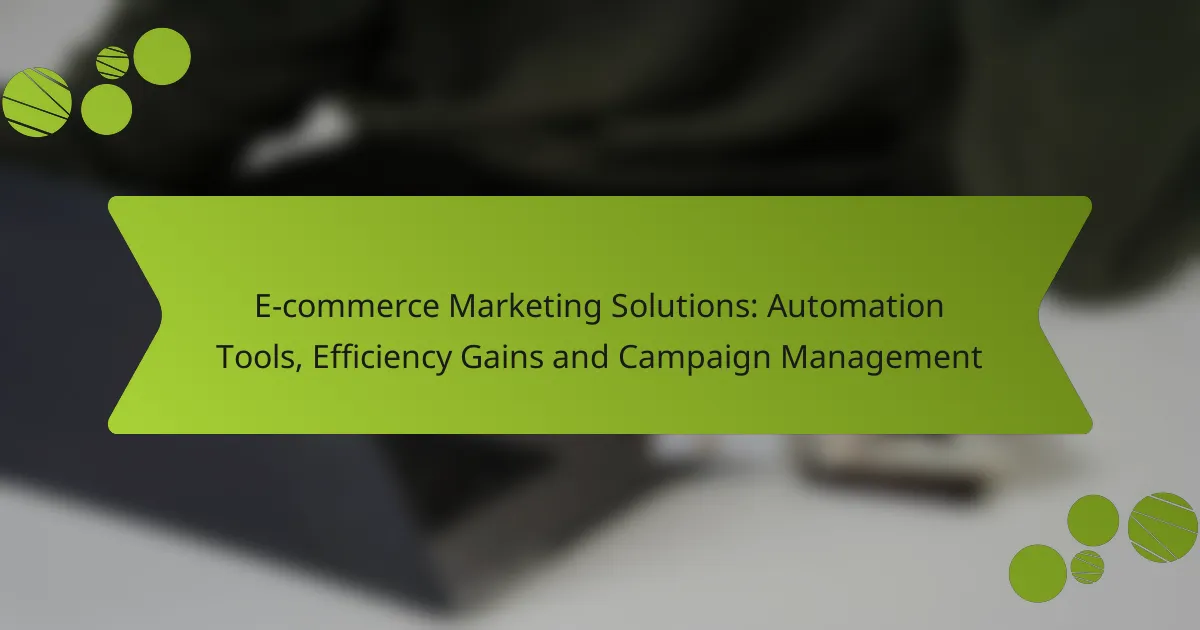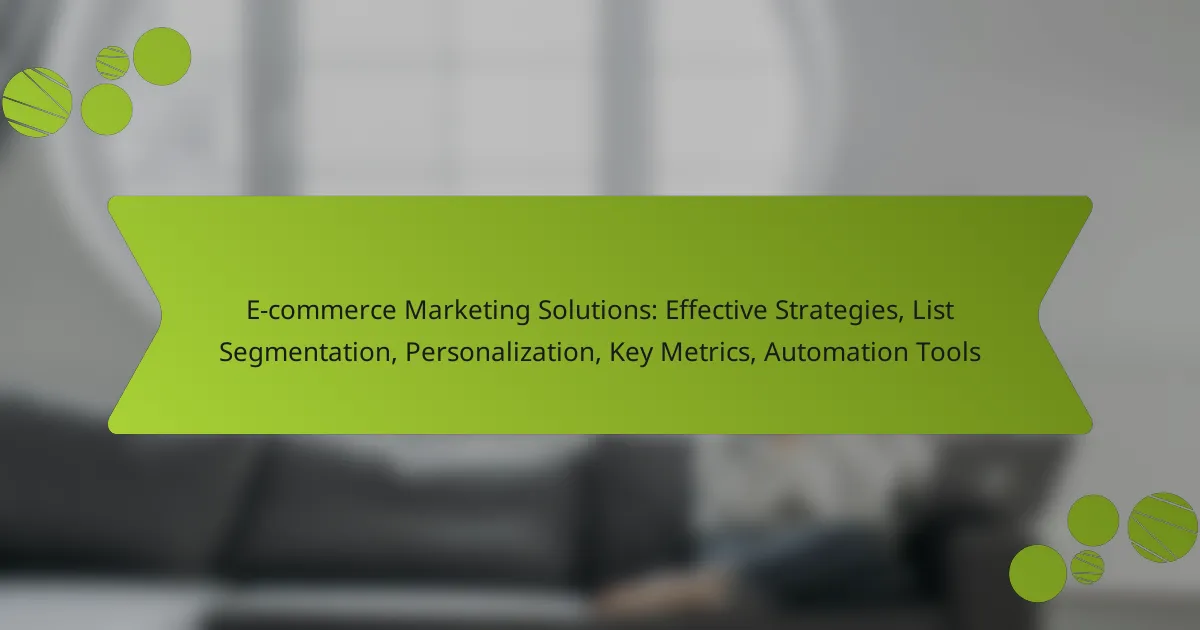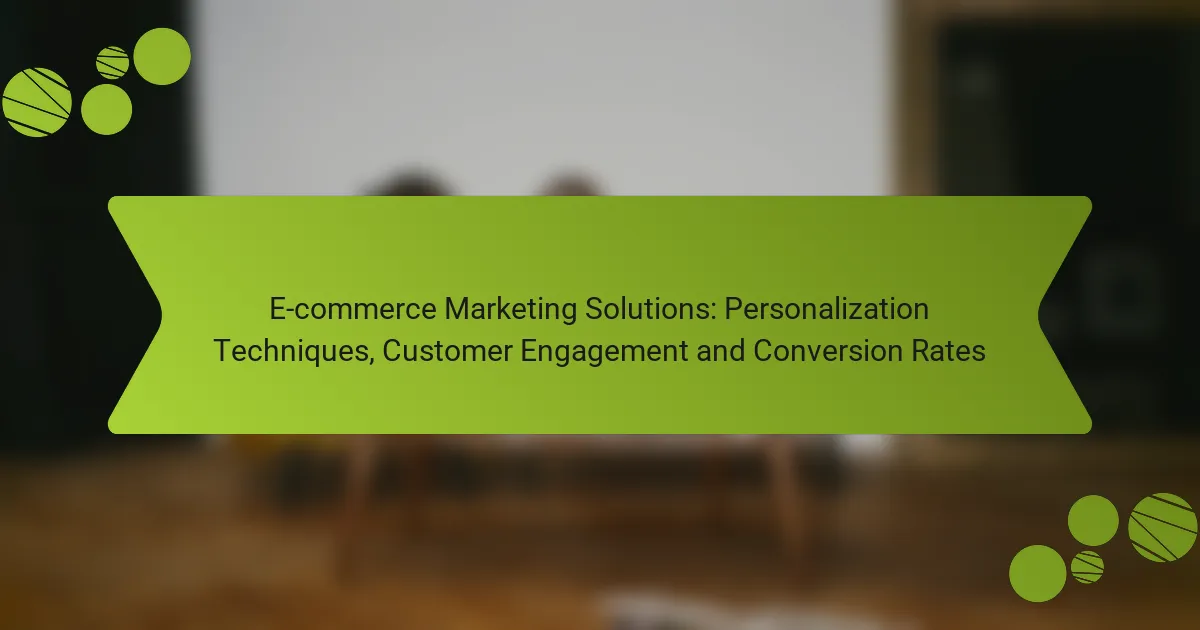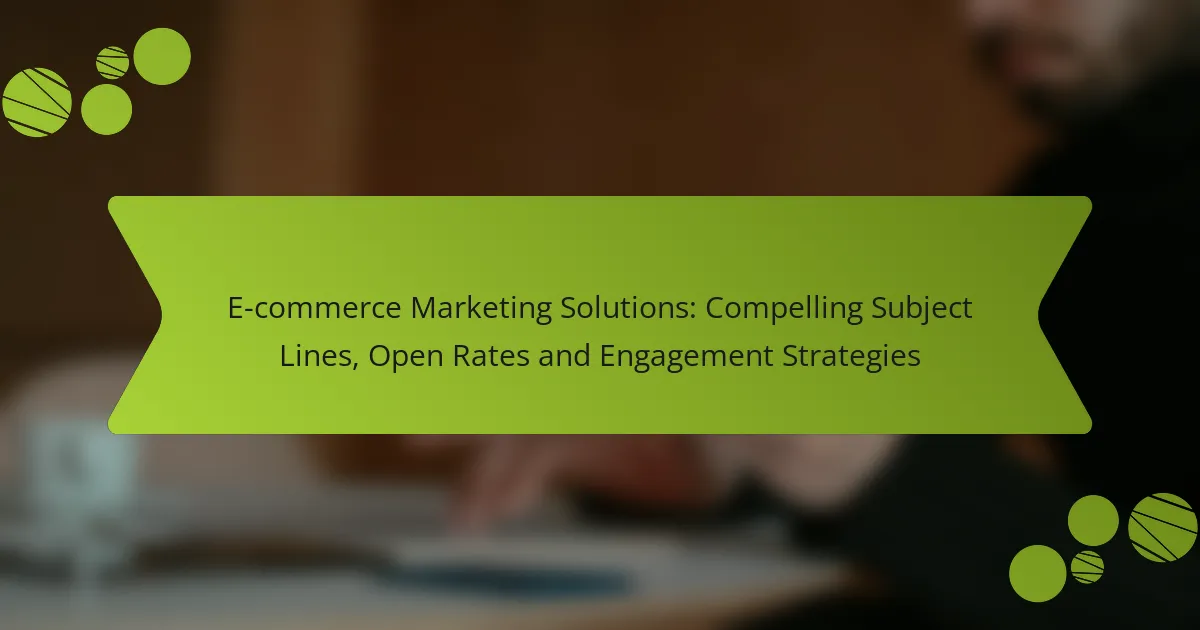E-commerce marketing solutions, particularly automation tools, play a crucial role in streamlining marketing processes and enhancing customer engagement. By automating repetitive tasks and effectively managing campaigns, businesses can significantly improve their operational efficiency and drive sales growth. Leveraging data and integrating multiple marketing channels further optimizes outcomes, ensuring a better return on investment.
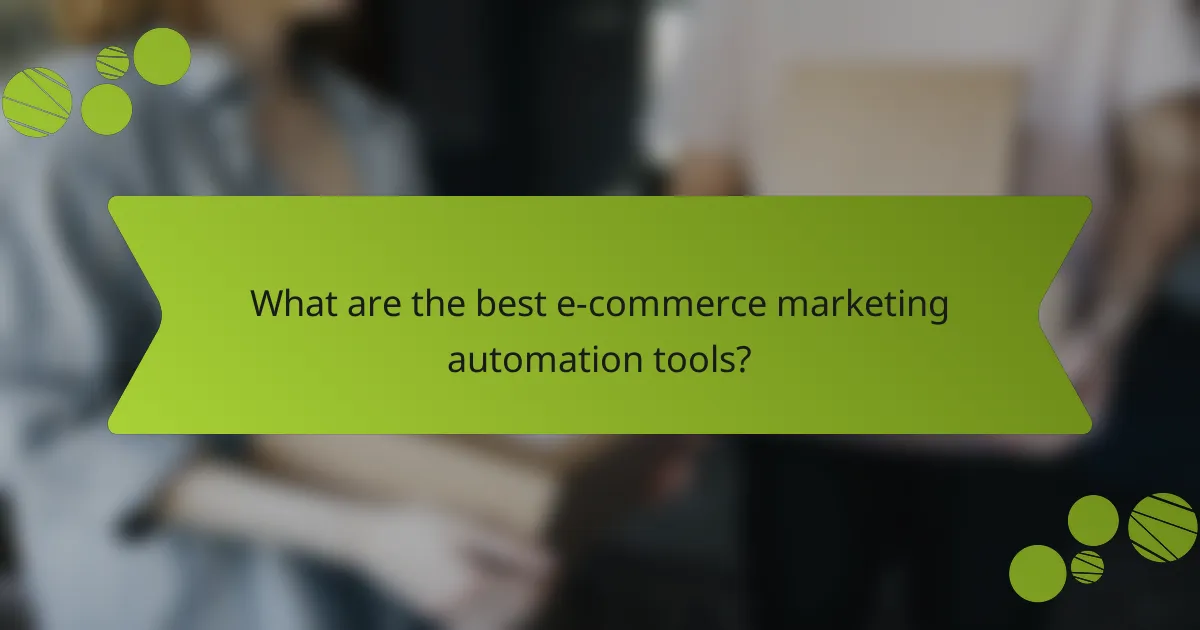
What are the best e-commerce marketing automation tools?
The best e-commerce marketing automation tools streamline marketing processes, enhance customer engagement, and improve overall efficiency. These tools allow businesses to automate repetitive tasks, manage campaigns effectively, and analyze performance metrics to drive sales growth.
HubSpot Marketing Hub
HubSpot Marketing Hub is a comprehensive platform that offers a range of automation features tailored for e-commerce. It includes tools for email marketing, social media management, and content creation, all designed to enhance customer interactions.
One of its key advantages is the ability to segment audiences based on behavior and preferences, allowing for personalized marketing campaigns. Businesses can expect to see improved engagement rates when utilizing these targeted strategies.
Mailchimp
Mailchimp is a user-friendly email marketing platform that also provides automation capabilities for e-commerce businesses. It allows users to create automated email sequences based on customer actions, such as cart abandonment or product recommendations.
With its intuitive interface, even small businesses can set up effective campaigns without extensive technical knowledge. Mailchimp’s analytics tools help track performance, enabling businesses to refine their strategies over time.
Klaviyo
Klaviyo is specifically designed for e-commerce, focusing on data-driven marketing automation. It integrates seamlessly with various e-commerce platforms, allowing businesses to leverage customer data for targeted email campaigns.
Its advanced segmentation and predictive analytics features help businesses send the right message at the right time, significantly boosting conversion rates. Klaviyo is ideal for businesses looking to maximize their return on marketing investment.
ActiveCampaign
ActiveCampaign combines email marketing, automation, and CRM features to provide a robust solution for e-commerce. Its automation workflows can be customized to fit specific business needs, making it versatile for different marketing strategies.
Users can create complex automation sequences that trigger based on customer interactions, enhancing the overall customer journey. This tool is particularly useful for businesses aiming to nurture leads and improve customer retention.
Shopify Email
Shopify Email is an integrated email marketing solution designed for Shopify users. It allows merchants to create and send marketing emails directly from their Shopify dashboard, simplifying the process for e-commerce businesses.
This tool offers customizable templates and automation features, making it easy to engage customers with targeted campaigns. Shopify Email is especially beneficial for businesses already using the Shopify platform, as it streamlines marketing efforts without the need for additional software.

How can e-commerce businesses improve efficiency with automation?
E-commerce businesses can significantly enhance efficiency through automation by streamlining repetitive tasks, allowing teams to focus on strategic initiatives. Automation tools can manage various aspects of marketing, from email campaigns to social media, leading to improved productivity and better customer engagement.
Streamlining email campaigns
Automating email campaigns allows e-commerce businesses to send targeted messages at optimal times without manual intervention. Tools can segment audiences based on behavior and preferences, ensuring that customers receive relevant content, which can increase open and conversion rates.
For effective email automation, consider setting up triggers for specific actions, such as cart abandonment or product recommendations. This approach can lead to higher engagement and sales, as personalized messages resonate more with customers.
Automating social media posting
Social media automation tools enable e-commerce businesses to schedule posts in advance, maintaining a consistent online presence without daily effort. This can save time and ensure that content is shared during peak engagement hours.
When automating social media, it’s essential to monitor analytics to determine the best posting times and content types. Using a mix of promotional and engaging content can help maintain audience interest and drive traffic to your online store.
Enhancing customer segmentation
Automation can significantly improve customer segmentation by analyzing data from various sources, allowing businesses to create more precise target groups. This enables tailored marketing strategies that cater to specific customer needs and behaviors.
Utilizing tools that integrate with your e-commerce platform can help in gathering insights from customer interactions, purchase history, and demographics. This data-driven approach ensures that marketing efforts are more effective, leading to better customer retention and increased sales.

What are effective campaign management strategies for e-commerce?
Effective campaign management strategies for e-commerce involve leveraging data, integrating multiple marketing channels, and tracking performance to optimize outcomes. These approaches help businesses enhance efficiency, improve customer engagement, and maximize return on investment.
Data-driven decision making
Data-driven decision making is essential for e-commerce success, as it enables businesses to base their strategies on actual consumer behavior and market trends. By analyzing customer data, companies can identify patterns, preferences, and purchasing habits that inform campaign adjustments.
Utilizing tools like Google Analytics or customer relationship management (CRM) systems allows for segmentation of audiences, enabling targeted marketing efforts. For instance, businesses can tailor promotions to specific demographics, increasing the likelihood of conversion.
Multi-channel marketing integration
Multi-channel marketing integration ensures that e-commerce campaigns reach customers across various platforms, enhancing visibility and engagement. This approach involves coordinating efforts across email, social media, search engines, and online marketplaces to create a seamless customer experience.
For effective integration, businesses should maintain consistent messaging and branding across channels. Utilizing automation tools can streamline this process, allowing for synchronized campaigns that adapt to customer interactions in real-time.
Performance tracking and analytics
Performance tracking and analytics are crucial for understanding the effectiveness of e-commerce campaigns. By monitoring key performance indicators (KPIs) such as conversion rates, customer acquisition costs, and return on ad spend, businesses can assess their strategies and make necessary adjustments.
Regularly reviewing analytics reports helps identify successful tactics and areas needing improvement. Setting up A/B testing can further refine campaigns by comparing different approaches and determining which resonates best with the target audience.
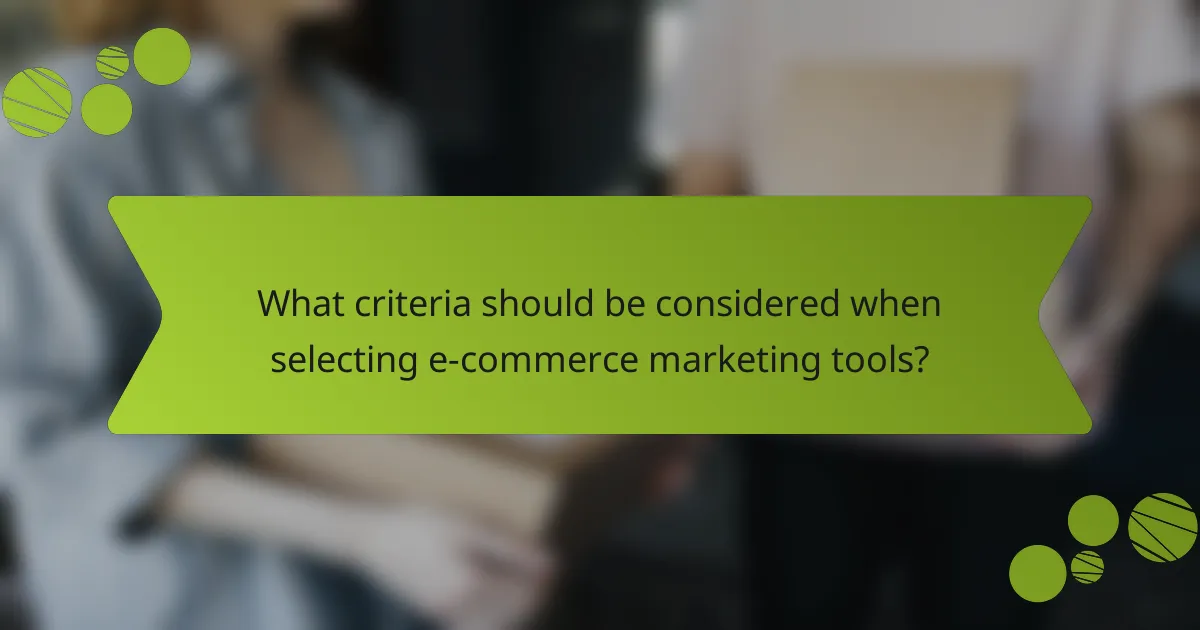
What criteria should be considered when selecting e-commerce marketing tools?
When selecting e-commerce marketing tools, consider integration capabilities, user experience, and cost structures. These factors will significantly impact the effectiveness and efficiency of your marketing efforts.
Integration capabilities
Integration capabilities refer to how well the marketing tools connect with your existing systems, such as e-commerce platforms, CRMs, and analytics tools. A seamless integration can streamline workflows and enhance data sharing, which is crucial for effective campaign management.
Look for tools that offer APIs or pre-built integrations with popular platforms like Shopify, WooCommerce, or Magento. This can save time and reduce the complexity of managing multiple systems.
User interface and experience
The user interface (UI) and overall experience of the marketing tools should be intuitive and user-friendly. A well-designed UI can significantly reduce the learning curve for your team, allowing for quicker implementation and better utilization of the tool’s features.
Evaluate tools through demos or free trials to assess their usability. Pay attention to navigation, accessibility of features, and the overall aesthetic, as these elements can affect team productivity and satisfaction.
Cost and subscription models
Cost and subscription models vary widely among e-commerce marketing tools, impacting your budget and ROI. Some tools offer tiered pricing based on features or usage, while others may have flat-rate subscriptions.
Consider your budget and expected growth when evaluating costs. Look for tools that provide flexible pricing options, such as pay-as-you-go or monthly subscriptions, which can help manage expenses as your business scales. Always review what features are included at each price point to ensure you’re getting value for your investment.

What are the emerging trends in e-commerce marketing automation?
Emerging trends in e-commerce marketing automation focus on enhancing customer engagement and streamlining operations. Key developments include AI-driven personalization, advanced analytics, and integration of multi-channel strategies to improve efficiency and effectiveness.
AI-driven personalization
AI-driven personalization tailors marketing messages and product recommendations to individual customer preferences and behaviors. By analyzing data from various sources, such as browsing history and purchase patterns, businesses can create a more relevant shopping experience.
To implement AI-driven personalization, e-commerce platforms often utilize machine learning algorithms that predict customer needs. For example, a clothing retailer might suggest items based on previous purchases or browsing behavior, increasing the likelihood of conversion.
When adopting AI-driven personalization, ensure data privacy compliance, especially under regulations like GDPR. Avoid overwhelming customers with excessive personalization, which can feel intrusive; instead, aim for a balanced approach that enhances the shopping experience without compromising privacy.





